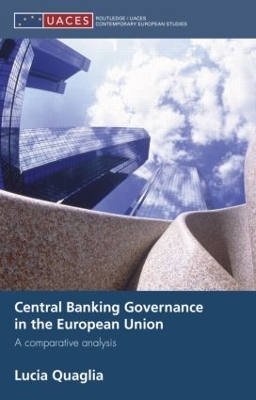Routledge/UACES Contemporary European Studies
1 primary work • 2 total works
Book 2
This book fills a gap in academic literature on the politics and public policy aspects of central banking in Europe, by conducting a theoretically-informed and empirically-grounded analysis of central banking governance before and after the establishment of the Economic and Monetary Union (EMU).
The main framework for analysis is a ‘multi-level institutionalist approach’, articulated on three interconnected levels: the ‘systemic-level’, which encompasses the European, transnational and international arenas; the ‘national-level’, which considers the configuration of the domestic socio-economic and political environment in which each central bank operates; and the ‘micro-institutional level’, which deals with the specific features of each central bank.
Methodologically, the research engages in a structure-focused comparison, using qualitative methods. In order to do so, it conceptually develops and empirically applies the notion of ‘mode’ of central banking governance, operationalised through four main components:
- the legal framework
- central bank ‘autonomy’ (or de facto independence) from the political authorities
- central bank ‘policy capacity’ in three policy areas that are crucial for central banking governance, namely monetary and exchange rate policies, financial regulation and supervision
- central bank legitimacy.
Empirically, this monograph focuses on the Bank of England, the Bundesbank, the Banca d'Italia and the ECB over the period 1979 to present, with particular attention paid to the last decade. It is grounded in in-depth and extensive primary research, enriched by interviews with policy-makers.
Central Banking Governance in the European Union will be of interest to students and researchers of Politics, Economics and Political Economy.
The global financial crisis that reached its peak in late 2008 has brought the importance of financial services regulation and supervision into the spotlight.
This book examines the governance of financial services in the EU, asking who governs financial services in the EU, how and why, and explaining where the power lies in the policy-making process. It covers the main financial services: banking, securities, payments systems, clearing and settlement. Addressing the politics and public policy aspects of financial market integration, regulation and supervision in the European Union, this book conducts a theoretically-informed and empirically-grounded analysis of financial services governance from the establishment of Economic and Monetary Union (1999) and the launch of the Financial Services Action Plan (1999), to date. It also assesses the EU responses to the global financial crisis.
Providing a reliable and unique insight into the politics of financial services regulation in the EU based on an extensive programme of interviews with policy makers and stakeholders across Europe, the book will be of great topical interest to students and scholars of European Union studies, political science and political economy.

